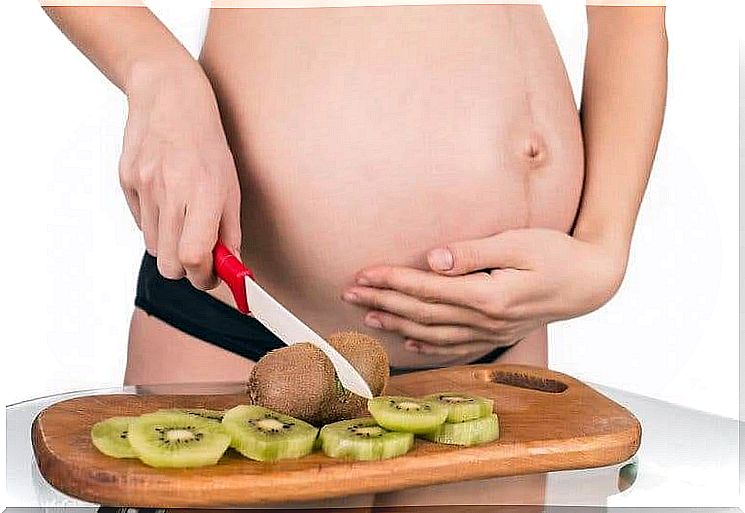Lack Of Appetite During Pregnancy

When women think about pregnancy, they fear weight gain the most, but lack of appetite is more common than we think. However, there are reasons for this and there are ways to deal with it and make sure we eat what our bodies and babies need.
We may even not be able to walk past our favorite restaurant just after the big news. Our fear is then replaced by: I am not hungry and I have to eat for two.
During the 40 weeks of pregnancy, we experience different symptoms and sensations. We don’t just feel the baby’s hiccups or other movements in our tummy. The hormones and changes your body is going through can also affect your eating habits.
Loss of appetite during pregnancy…why can’t I eat?
Every woman is different and therefore every pregnancy is different. You may have cravings and eat strange combinations of foods like jelly with lentils.
You may not notice the changes yourself. However, don’t worry if you suffer from a loss of appetite during pregnancy, it is most likely due to natural causes.
Reasons for lack of appetite during pregnancy can vary from one extreme to another. During nine months we experience so many different physical, chemical and emotional changes.
Number One: Hormones

Hormonal changes also vary the way pregnancy affects our appetite. The so-called pregnancy hormone, human chorionic gonadotropin or HCG, is only present in our blood during pregnancy.
It is responsible for causing nausea and vomiting. These conditions are probably the leading causes of poor appetite during pregnancy, especially during the first trimester.
HCG also produces other hormones, such as estrogen and progesterone. The latter may also be a factor in causing a loss of appetite as it is known to slow down the digestion process.
Changes inside and out
When the body prepares to carry a baby, the muscle structure of the abdomen begins to relax. This is another reason why we can suffer from poor appetite during pregnancy. General discomfort and fatigue can also affect it.
In addition, between the second and third trimesters, the digestive system slows down. The pressure against the small intestine caused by the growth of the uterus and the size of the fetus can also slow digestion, which in turn can affect your appetite.
Some women suffer from constipation or gas, which causes stomach upset and slow digestion. This can also reduce appetite. Heartburn can also cause us to lose our appetite.
Summer months
We are more bothered by the heat when we carry a baby in our belly. If we take into account that part of our pregnancy can fall during the summer months and in warmer weather, then it is likely that we do not want to eat.
In addition, we are more likely to suffer from conditions caused by seasonal changes such as spring fatigue. That “slump” we feel at the beginning of spring can trigger symptoms like fatigue.
If it affects emotions
All the hormonal changes we experience make us more sensitive. If we take into account the stress and anxiety we experience when we wait expectantly for our baby to be born, pregnant women can experience a plethora of emotions.
This emotional flurry may be a psychological reason behind our lack of appetite. Mood swings can also cause us to skip our favorite meals.
What to do if you lose your appetite during pregnancy
As you can see, most of the causes are due to normal and natural reasons. So there are simple ways to deal with it so that we can enjoy our pregnancy and food without feeling stressed or shocked.
Go to a doctor first
The first thing we should do is see a doctor who can rule out other important factors. You can have simple medical tests to make sure the mother and baby are getting the right amount of vitamins and minerals necessary for good health.
The doctor can also determine if you need anything specific to supplement your diet. It is important to remember that at this stage we need to be more aware of what we are eating. So it is best to follow the advice of a specialist.
Slow but sure
Eating little and often is ideal. We recommend eating something light every two and a half to three hours. You need to prepare your stomach so that you don’t overeat. It can also help activate digestion and metabolism and avoid acidity.
If you suffer from morning sickness, it is advisable to put some bread or crackers by your bed to curb the nausea, which will help you get up.
Do’s and don’ts

Choose foods that your digestive system can tolerate. Preferably healthier food for you and your baby. Learn to identify the foods that cause you the most discomfort, remove them from your grocery list, and avoid them when dining out.
Also try to identify those that you can tolerate, that do not cause aversion or bloating, and include them in your diet. Make sure they are natural or unprocessed foods.
The obvious ones are heavy, salty foods with lots of sauce, saturated fats, and fried foods. The decisions you make regarding your diet in the first few months are vital to overcoming your own mistakes.
Fruit and vegetables
Your diet should be filled with plenty of fruits and vegetables. They provide the most nutrients, cause the least discomfort, and provide the fluids that meet your body’s needs.
There is a wide variety of legumes and vegetables. So there are no excuses to exclude them from your diet. A piece of fruit is the best option as a snack. You can eat this on the go. Fruit is an energy booster and high in fiber, which helps improve digestion.
Plan ahead
It’s a good idea to create a weekly meal plan, or at least prepare a daily meal the night before. When you get up, you know what you eat as a snack, for breakfast and for the rest of the day.
Make a good breakfast, eat less at lunch, and eat in the evening during the cooler hours of the evening. Always carry a light snack with you to avoid not eating at all or buying junk food. Try to eat something every three hours, even if you are not hungry.
Prepare meals that can be stored in the refrigerator. Avoid overly complex recipes, as the smell is likely to make you nauseous. Vary your meals, look for different ways to prepare food so they don’t bore you.
Stay hydrated
Your doctor will tell you to stay well hydrated during pregnancy to maintain well-functioning kidneys and prevent fluid retention. This is also a good way to deal with the lack of appetite during pregnancy.
Always choose:
- Water
- herbal tea
- Low sugar juices
If you suffer from overheating during your pregnancy, try to include the following options in your meals and snacks: gazpacho or smoothies that contain a lot of vegetables.
Avoid a sedentary lifestyle

Exercise, even if moderate, will give you many benefits during meals. Your digestive system will work better by:
- To walk
- to practice yoga
- To train with little impact
The right postures also help you with sitting, eating and also with the digestion process. Exercise usually increases appetite, which is something to deal with during pregnancy.
It’s not about training too much, of course. Respect and appreciate your moments and rest days. When lying down, it is better to sit halfway, not fully recline, to avoid reflux and a burning sensation in the stomach.
Latest Recommendations
So it is important to remember that your body undergoes natural changes that are necessary for the proper development of your pregnancy and baby.
The morning sickness that you face during the first trimester and that prevents you from enjoying food will pass quickly. You can come out of the first trimester with a “fresh” appetite, which should be controlled with good eating habits.









